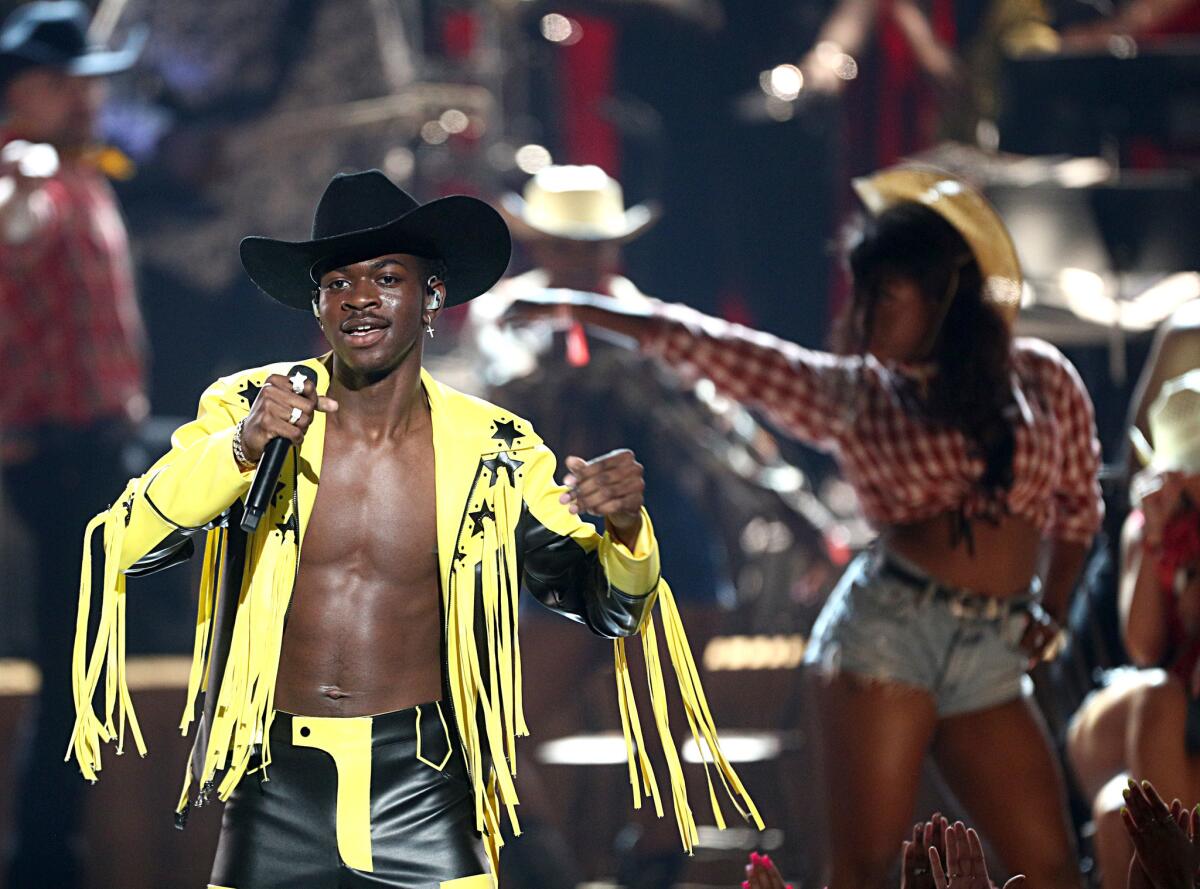Lil Nas X makes Grammy history as the first openly gay rapper nominated in top categories

- Share via
Last week Lil Nas X made history when his earworm of a hit “Old Town Road” nabbed a Country Music Assn. award, making him the first openly gay black male to do so.
Yet “Old Town Road” — which spent much of the year as the No. 1 song in the country — wasn’t awarded in any major category at the CMAs. Instead, it was relegated to musical event of the year.
Lil Nas X’s CMA win made it clear that although Nashville couldn’t ignore the record-breaking success of the country-rap anthem, which featured “Achy Breaky Heart” singer Billy Ray Cyrus, it didn’t see the song as more than a musical meme.
That hand-wringing over genre and where the 20-year-old Atlanta rapper and singer — born Montero Lamar Hill — fits in the conversation of rap and country was largely an afterthought for the Recording Academy, which rewarded Hill with a bounty of Grammy nominations early Wednesday morning.
Hill scored six nods, including new artist, record and album of the year, for “7.” However, the album wasn’t recognized in the rap genre, nor was “Old Town Road” nominated in country (Hill’s singles also scored nominations in the rap sung and pop duo/group categories).
By the time most of us heard “Old Town Road,” teenagers on the video-sharing app TikTok had already been obsessing over the tune, which fused together lo-fi trap and banjos lifted from a Nine Inch Nails sample, for months.
Yet as the record went from viral meme to cultural phenomenon — eclipsing a chart record that Mariah Carey and Boyz II Men set over two decades ago — Hill was often dismissed as a novelty act: too rap to be country, too country to be considered real hip-hop.
When Billboard initially decided to bump the record from the country charts this spring due to it “not embracing enough elements of today’s country music in its current version,” “Old Town Road” became a lightning rod in an ongoing conversation about country music’s relationship with black artists.
As the unlikely focus of a raft of think pieces dissecting race, genre and authenticity, Hill’s decision to come out as gay while “Old Town Road” rode the top of the charts was all the more powerful.
Seemingly overnight, Hill became the biggest gay pop star in the world and did so in the orbit of hip-hop and country, genres that have historically snubbed queer artists. Although he’s not the first queer artist to compete in the major categories at the Grammys (Sam Smith was the first openly gay artist to win record of the year in 2015), Hill is the first gay rapper to be nominated.

Meanwhile, Lil Nas X’s multiple nominations will do little to quell the distrust between the hip-hop community and the Recording Academy. Over the years, as groundbreaking works from Kanye West, Drake and Kendrick Lamar were given short shrift, hip-hop’s biggest stars have gone from grumbling about Grammy night to outright snubbing it.
Tensions warmed in 2016 when Chance the Rapper made history as the first artist to win a Grammy for a streaming-only album — a sign that the Recording Academy was, at last, paying attention to how rapidly rap was changing the rules on how music was consumed and how artists broke into the mainstream.
In 2017, the big four categories leaned heavily toward hip-hop and urban music for the first time, a sea change that was the result of ongoing efforts by the academy to ensure its voting members were actively engaged in making music, and of the introduction of online voting.
The following year, Childish Gambino became the first musician to win song and record of the year for a rap track, with his poignant, politically charged single, “This Is America.” (Gambino was one of several major artists who sat out the ceremony and declined to perform.)
Hill’s cadre of nominations — along with a record of the year nod for Post Malone and Swae Lee’s dreamy rap ballad “Sunflower” — show a continued effort from voters to embrace hip-hop as a whole.
Slain L.A. rapper Nipsey Hussle landed three rap nominations, and newcomers YBN Cordae and DaBaby scored two.

Tyler, the Creator, the rowdy former frontman of L.A.-based hip-hop collective Odd Future, was nominated in rap album for his ambitious “Igor” but shut out in the more prestigious overall album category.
Hip-hop favorites Chance the Rapper, 2 Chainz, YG, Logic, Schoolboy Q and Future all failed to receive nominations for their recent releases.
Following Cardi B’s watershed moment of becoming the first solo female performer to win for rap album, there’s little representation for the women who have broken out in her path. Viral newcomers Megan Thee Stallion and Saweetie were both shut out, and veteran emcee Rapsody — whose acclaimed album was released just before the eligibility cut-off date — also failed to garner a nomination.
And then there’s Lizzo, who broke through as a rapper and singer this year. Like Hill, she sparked a conversation over genre lines and has more than once argued her right to classify herself as a rapper. The Grammy voters made her the most nominated artist with eight nods, but she too was excluded from rap categories and instead sees her nods spread across the main categories, pop and R&B.
More to Read
The biggest entertainment stories
Get our big stories about Hollywood, film, television, music, arts, culture and more right in your inbox as soon as they publish.
You may occasionally receive promotional content from the Los Angeles Times.











